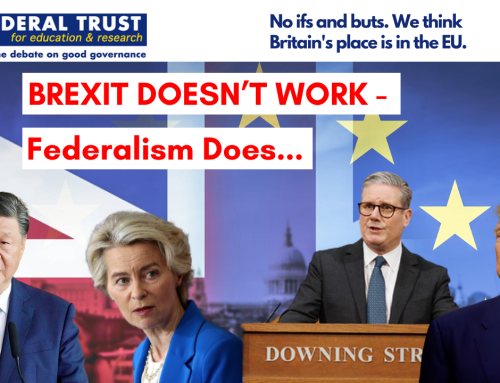The Financial and Economic Implications of Brexit
Speech by Sir Brian Unwin KCB, former President of the European Investment Bank, to the Jean Monnet Conference on Radical Political Movements in Europe at Lublin, Poland, on 8 September 2017
It is a great pleasure to be invited to this conference about the growing popularity of radical political movements in Europe. My subject is the financial and economic implications of Brexit, and I think it can be argued that the UK referendum vote last year to leave the European Union (EU) was an example of this phenomenon – a radical and unexpected shift in popular opinion – and therefore can be related to the political developments here in Poland and in other European countries, I must tell you straightaway, however, that I regard that vote, which was advisory and not binding, and won only by a minority of the eligible voting population (37%), as a disaster for both Britain and the EU, and I will try to explain this afternoon why that is my opinion.
My colleague, Nicolas MacLean, has already spoken about the political aspects of Brexit. I will not seek to repeat that but will concentrate on the key financial and economic aspects of an immensely complicated situation – described by someone as trying to unravel a congealed dish of spaghetti. In order to bring the gravity of the situation more vividly to your minds, I would like you to imagine that you are a visitor to the UK from Mars, trying to understand what is currently happening in the British economy.
What will you find? First of all, a divided country with an economy under stress and uncertainty in nearly every sector. Although the immediate effects of the referendum were not as severe as some had predicted, growth has slowed down and is unlikely to exceed much more than 1% in the current year, putting the UK at the bottom of the EU and advanced economy league tables. As a result of a significant fall in the value of the pound sterling against other currencies – which has so far not led to an export boom – inflation is increasing and outstripping the average increase in earnings. This means that household incomes are decreasing, and people are getting poorer, leading to a dangerous increase in reliance on credit in many forms – credit cards, car loans, overdrafts and so on – which could lead to another credit and banking crisis. All this in turn means that the already low level of savings in the economy is declining even further, with adverse consequences for investment and productivity, in which Britain already lags behind its main developed world competitors.
Behind this general picture you will also observe an alarming sense of uncertainty, lack of confidence and even panic in many sectors of the economy which are trying to devise damage limitation measures to protect themselves against the threats they see facing them. Prominent among these sectors is the financial services industry – the banks, finance houses, insurance companies and so on which employ over two million people, provide 12% of all UK tax revenue, and at present guarantee London’s pre-eminence as a global financial centre. Their worst fear is that in the future they may be deprived of the so-called “passport” to operate freely in the EU and many of them are already planning to move staff and operations from London to other financial centres such as Frankfurt, Paris, Amsterdam, Dublin or Luxembourg – a shift which Ernst and Young, a leading accountancy firm, have estimated could cost London alone over 80,000 jobs.
Other important sectors of the economy are hurrying to erect their defences too. Major businesses such as the automotive, pharmaceutical, chemical and food and farming industries are gravely concerned about the threat they perceive to the present “frictionless” tariff free trade relationship with the EU, to which nearly 50% of British exports go. They fear a future in which tariffs and non-tariff trade barriers such as public health controls, rules of origin and other customs and border checks are restored, with all that that entails for bureaucracy, delays, supply chains and extrta costs. For example, around 70% of UK trade in food and beverages is at present with the EU and abolition of the current customs and related arrangements would undoubtedly lead to an increase in the price and a reduction in the variety of food products on the British market.
There are other threats on the horizon too, particularly if Britain is excluded from the hundreds of other international agreements to which it is a party by virtue of its EU membership – some of them perhaps in unexpected areas. For example, If Britain were to cease to belong to international aviation agreements such as the Open Skies agreement with the USA and the European Common Aviation Agreement , British based airlines could lose the right to fly to America or to and between EU cities. The Chairman of Ryan Air, Michael O’Leary, has just expressed extreme concern about this. The nuclear industry too is seriously concerned at the possible cessation of cooperation with and supervision by the EU atomic energy authority, Euratom.
Worse still, there is increasing evidence that as the threats develop EU nationals – of whom there are some 3 million in the UK – are beginning to leave the country. This is partly due to the fall in the value of the pound, which reduces the value of any remittances they make to their home country, and partly because of an increasing feeling that they are no longer welcome because of whipped up prejudices against immigration. If such an exodus gains momentum, combined with a parallel fall in the number of EU citizens seeking to come to work in the UK, it will be catastrophic not only for the hotel, restaurant and hospitality industries – an estimated 25% of chefs and 70% of waiters working in Britain are EU nationals – but also for the farming and horticultural industries and for great institutions such as the National Health Service (NHS) which rely heavily on immigrant skills. For example, the number of trained nurses from the EU applying to work in the NHS, which has an acute shortage of nurses, has already almost completely dried up, and it is obvious to anyone lucky – or unlucky – enough to attend a NHS hospital that without such staff, at all levels, from the EU and elsewhere, the service will collapse.
Universities and research institutions are anxiously taking measures to maintain the reciprocal flow of both students and high level academic staff from abroad, and are gravely concerned about the potential loss of valuable EU research grants and cooperation. At the manufacturing level, a recent survey by the UK Engineering Employers Federation (EEF) also suggests that a third of all companies in Britain rely on EU nationals to supply skills that are not readily available in the UK, and that applications from such personnel have recently fallen by a quarter. I could go on from industry to industry, but there is not time.
What is causing this deteriorating and dangerous situation? What hostile external power can the visitor from Mars identify? The truth is that there is no hostile power. The actual and potential damage I have described is entirely self-inflicted. It is a function of the present government’s decision to leave the EU in March 2019 and to go for a so-called “hard” Brexit without any assurance of future economic and trading arrangements remotely equivalent to those that it currently enjoys by virtue of its EU membership.
To be more precise, the present government adamantly rules out continuing membership of the EU single market and customs union, relying on vague proposals – in reality no more than aspirations – for an unspecified “transitional period” during which it claims it will negotiate a satisfactory “bespoke” trade deal with the EU and other nations and trading blocks. No serious commentator believes that this is achievable – trading agreements take years to negotiate and there is currently a shortage of experienced trade negotiators in London. Unless the government relents it will inevitably be forced to trade under World Trade Organisation (WTO) rules, which do not cover financial services and will entail substantial tariffs and all the controls and delays that that entails. Economists have estimated that this could cut UK trade by 40%b over 10 years. Equally, unless the government modifies its commitment to reduce annual net immigration to “tens of thousands” (compared with recent annual figures of around 250,000), the serious skills and other shortages to which I have referred will become a reality.
Little progress has been made in the negotiations with the EU Commission so far. The clock is ticking fast and we cannot rule out a complete breakdown in the talks. The EU negotiators have made it clear they are unwilling to discuss future trading relationships until “satisfactory progress” has been made on a prior list of separation items, such as the discharge of the UK’s financial liabilities to the EU (the so-called “divorce Bill”), the rights of EU citizens in the UK, the continuing jurisdiction of the European Court of Justice (ECJ), and the border between Northern Ireland and the Irish Republic. The EU 27 heads of government will consider this at a summit in October, but I am not optimistic that they will judge that progress has been sufficient.
As a patriotic British subject I am in a dilemma. I hope that somehow an agreement acceptable to both sides – perhaps on the model of the EU’s relationship with Norway – can be reached. But at heart I do not believe that there is such a thing as a “good” Brexit, and I fervently hope that as the self-inflicted damage to the British economy and financial system becomes as clear to the British public as it would be to a visitor from Mars, there is a change of heart and Brexit is called off. What madness it is, at a time when there are so major dangerous crises throughout the world, for the UK to be following a policy that will not only inflict major economic damage on itself but divert the EU from the other more important issues that face it both within Europe and in the wider international context.





